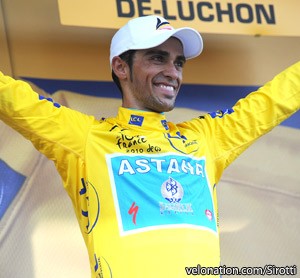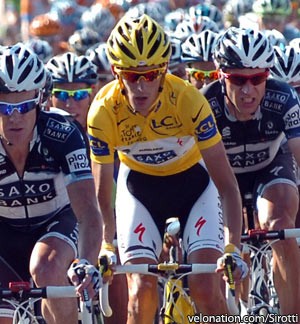That is the Question
 Andy Schleck (Saxo Bank) unshipping his chain just as things were hotting up on the hors category Port de Balès cost him his yellow jersey; it may have cost him the race. The boos and whistles that could be heard as defending champion Alberto Contador (Astana) pulled on his first yellow jersey of the race were testament to the fact that many felt that the Spanish rider was wrong to take advantage of his rival’s misfortune.
Andy Schleck (Saxo Bank) unshipping his chain just as things were hotting up on the hors category Port de Balès cost him his yellow jersey; it may have cost him the race. The boos and whistles that could be heard as defending champion Alberto Contador (Astana) pulled on his first yellow jersey of the race were testament to the fact that many felt that the Spanish rider was wrong to take advantage of his rival’s misfortune.
Tradition dictates that if the yellow jersey suffers from a crash or a mechanical problem his rivals don’t attack him, so does this mean that Contador should have waited for Schleck?
In 2003, when Lance Armstrong’s handlebar caught the string handle of a souvenir bag held by a spectator he went crashing to the ground, also bringing down Iban Mayo. Jan Ullrich, who’d been sitting in third wheel managed to get around the two falling riders; but rather than capitalising on Armstrong’s bad luck in the closest Tour in years, the German eased his pace and waited for the American to catch up.
(I’m not going to get into that argument – he just did okay? Even Armstrong himself has acknowledged the fact)
“Angry Schleck” calms down
After crossing the line, Schleck was furious. “Now I’m really angry. I will ride on the Tourmalet until I fall from my bike and give everything to this race,” he told the press after he’d finished. He then had to stand and watch Contador put on the yellow jersey as he stood and waited for the presentation of the white one.
After a while though, and having cooled down in the Saxo Bank team bus, he was calmer but no less determined to take the jersey back. ”I was feeling strong and determined throughout the stage and the team really everything to put me in the perfect position for the final climb,” he said. “When I launched my second attack, the chain got stuck and I had to get off the bike to put it back on. Then they attacked. I probably wouldn’t have done it like that. I’m just really looking forward to getting another chance of attacking.
“The jersey deserves honour,” he concluded.
Contador for his part claimed not to have known what the problem was. “I didn’t know anything about the problems with Andy Schleck,” said the new yellow jersey, “but when I realized it I was already ahead of him. The only things that I saw was that he was beginning to attack and then he slowed down. I didn’t realize that he had a problem with the bike.”
The latest incident in an incident packed Tour
The 2010 Tour de France has already been subject to a great number of controversial incidents and unfortunate crashes. Schleck himself has already fallen victim to one of these on stage 2, when he crashed twice on the wet, oily descent of the Col de Stockeu. That day, under the instigation of Schleck’s teammate Fabian Cancellara, the entire peloton was neutralised, not only so that Schleck and the other fallers could catch up, but all the way to the finish in Spa.
It could be argued that the Luxemburger has already used up one big favour, as Contador noted. “In Spa, he had big crash but today when I attacked it wasn’t because I knew he had problems,” he said.
 The next day, as the peloton crossed the notorious, fearsome pavé of northern France, a crash near the front of the field delayed almost everybody. Schleck himself was one of the few riders to have been in front of the crash as it happened – and sadly his elder brother Fränk was the chief victim with a broken collarbone – but this did not stop Cancellara from capitalising on the split in the field and driving Schleck on to the finish.
The next day, as the peloton crossed the notorious, fearsome pavé of northern France, a crash near the front of the field delayed almost everybody. Schleck himself was one of the few riders to have been in front of the crash as it happened – and sadly his elder brother Fränk was the chief victim with a broken collarbone – but this did not stop Cancellara from capitalising on the split in the field and driving Schleck on to the finish.
Contador lost 1’13” to Schleck on that stage, despite chasing hard to catch up for the best part of 25km. The pace of two-time Paris-Roubaix winner and Olympic and World time trial champion Cancellara, with the help of Schleck and World champion Cadel Evans (BMC Racing) was too much for the Spanish climber to contend with.
What made the incident on stage 3 so very different from the one on stage 2? And what made both of them so very different from today’s untimely mechanical?
But was it a mechanical anyway?
Schleck dropped his chain as he was changing gear as he attacked on the climb; this differs from other mechanical problems like punctures in that it was Scleck’s error that caused it. Bike racing is about more than just the strongest rider winning; bike handling is also an important factor, of which gear changes are a part.
It also took him two attempts to put his chain back on, as the first time he failed to put it all the way around his chainring and it came off again as he tried to remount.
Contador was already at attacking speed as he passed the stricken Schleck, he may or may not have known what was going on. Regardless of whether he knew or not though, he had no obligation to wait for a rider who made a mistake. Schleck messed up, Contador capitalised.
By the finish Contador had taken 39 seconds out of Schleck, to move ahead of him in the overall classification by a slim 8 seconds. (Hmm, leading the Tour by 8 seconds; where have I heard that before?) The time Contador took back today is just over half of what Schleck took out of him on the cobbles. Touché.
How decisive will this be?
Hopefully, by the time the race reaches Paris this coming Sunday, one or the other rider will have used the two remaining mountain stages, or Saturday’s 52km time trial, or both, to take a decisive lead.
If Schleck wins the Tour, or Contador takes it by more than 39 seconds this will all be forgotten about; if not this incident will be talked about for years.
“I’m sure he will attack me and I always have fear of what he might be able to do…” said Contador.